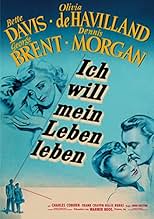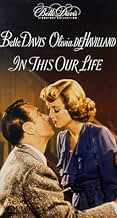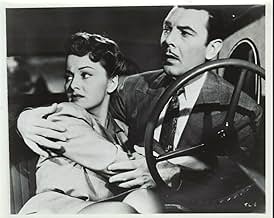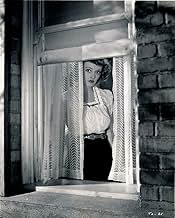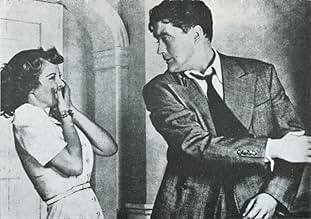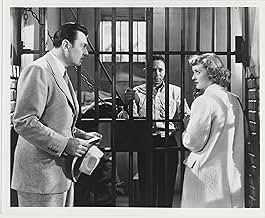The day before her wedding, a pampered young woman absconds with her sister's husband. Her sister begins seeing the woman's former fiancé.The day before her wedding, a pampered young woman absconds with her sister's husband. Her sister begins seeing the woman's former fiancé.The day before her wedding, a pampered young woman absconds with her sister's husband. Her sister begins seeing the woman's former fiancé.
- Directors
- Writers
- Stars
- Awards
- 3 wins total
- Worker
- (uncredited)
- Worker
- (uncredited)
- Directors
- Writers
- All cast & crew
- Production, box office & more at IMDbPro
Featured reviews
Stanley, the girl at the center of the story has it all. She is the favorite niece of the man who was responsible for ruining her father, a gentle soul beaten by the Great Depression. Stanley is a spoiled woman who couldn't care less who she hurt, let alone that is her own sister the one that will suffer because of her actions.
On the other hand, Roy, the good sister, is all kindness; she is just the opposite of Stanley. When Stanley decides she wants Peter, Roy's husband, she doesn't hesitate one second. She takes him and runs away to a life that proves not to be all what she imagined it would be.
Life intervenes in Stanley's life in tragic ways. First with Peter, the man he shouldn't have taken away from her sister, and then when trying to get back with Craig, she causes the death of a young girl when driving under the influence. This would have been a sobering experience for anyone, but Stanley is beyond repentance. Stanley, is a coward who will do anything to get away with murder.
Stanley was a role tailor made for Bette Davis. Her take on this impudent girl is perfect. Ms. Davis shows how good she is in small details that convey her understanding of her character. Ms. Davis reflects all the emotions Stanley is going through with her expressive eyes. One look at her and we know what this woman is capable of.
Olivia de Havilland makes an impression by playing the good sister, Roy. Ms. de Havilland is an actress that always played convincingly in everything she did, as is the case here. Her inner strength is her best asset. Roy is loyal to the point of sacrificing her own happiness and lets her sister take what she loves most.
The strong cast behind the principals is equally excellent. Dennis Morgan is Peter, the man blinded by Stanley. He will leave his adoring wife for a woman he ends up detesting. George Brent, is the kind Craig, the man jilted by Stanley who finally finds love again with Roy. Charles Coburn plays Uncle William with his usual panache. Frank Craven is Asa, the man cheated out of his fortune. Ernest Anderson makes an impression as Parry, the young black man with ambitions to improve himself. Hattie McDaniel only has a couple of key scenes where she shines. Billie Burke and Lee Patrick are seen in minor roles.
The musical score by Alfred Newman enhances the film. Ultimately it's John Huston who shows a clear understanding for the material and who gets excellent performances out of everyone.
"In This Our Life" is a film directed by John Huston about a selfish and evil woman. His tight direction saves the dramatic and tense story from becoming a melodramatic soap opera. Bette Davis steals the show with a fantastic performance. The rest of the cast is also magnificent. My vote is eight.
Title (Brazil): "Nascida para o Mal" ("Born to the Evil")
Although quite frankly both these women could have pulled off each other's roles in In This Our Life. They certainly proved over the course of their careers that they had the acting chops. The property seemed a natural for them as they play women of southern origin.
Olivia's good sister is not quite as Pollyannish as her Melanie Hamilton from Gone With The Wind. But almost to the very end she allows Bette and her whims and desires to run roughshod over her life.
The film does revolve around Bette and her character is an exponential version of Julie Marsden from Jezebel. She's a selfish willful flirt who thinks absolutely of nothing except herself and causes havoc to all around here.
As the story opens Bette is keeping company with lawyer George Brent and Olivia is getting married to young doctor Dennis Morgan. On an impulsive whim and maybe to prove she can do it, Bette takes Morgan away from Olivia and they run off and get married. But Bette doesn't want the honeymoon to end and poor Morgan can't keep up with her partying. Realizing what he did he kills himself.
But that's far from the end of things. Davis who loves to speed her car, causes a hit and run accident that kills a young girl and badly injures her mother. She casts blame on a young black kid Ernest Anderson who is working and clerking in George Brent's office and is the son of Timberlake maid Hattie McDaniel.
The story is set in Virginia, not the deep South, but deep enough so that despite Anderson's denials, the law will just take white woman Davis's word as a matter of course. If it were Alabama, probably Anderson would have been lynched given those times. She knows this and for a while exploits the racism in her society.
Ernest Anderson's role was an incredible milestone for its times, showing a black young man who aspired to a professional life. In This Our Life is quite the indictment of Southern society of the time.
Another role that got acclaim for a different reason was Charles Coburn as the uncle whose 'affection' for Davis can't be mistaken for anything else, but incestuous desire. He's the main employer in the town and pretty much makes the law around there. Davis's last scene with Coburn is one of the best in the film and reveals everything about both of these disreputable people.
John Huston even got his father Walter to play an unbilled small bit as a bartender. The bartender it turns out is the key to getting at the truth for the police authorities.
In This Our Life is one of Bette Davis's meatiest roles. Huston is a good enough director though to not let her pyrotechnics blot out the rest of the cast. For fans of Bette this one is a must.
This is the second film directed by John Huston, following his impressive debut with 'The Maltese Falcon'. Considering how far removed the subject matter is from Huston's usual territory, he does an impressive job here. More about Huston a bit later.
Here we have Bette Davis and Olivia de Havilland as sisters, and there are no prizes for guessing which is the bad sister and which is the good 'un. The sisters are named Stanley and Roy, but there's no sexual subtext for those male names. The bad sister, having dumped her boring fiancé (George Brent), sets her cap for the good sister's handsome husband (Dennis Morgan).
In her later years, Bette Davis occasionally gave informal talks at colleges in California. My future sister-in-law was present at one of these. During the Q&A, an eager fan breathlessly pointed out that Bette Davis had co-starred with Bogart, Cagney, Spencer Tracy, Ronald Reagan, Errol Flynn and other great male stars ... so, who was her favourite? Without hesitation, Davis replied 'George Brent', leaving most of the audience to murmur 'Who?'. It's not hard to guess the reason for Bette's preference. Brent was a bland leading man who concentrated on making his leading ladies look good, never generating a screen presence with the wattage of Bogart or Cagney. Davis preferred working with Brent because -- unlike Bogart or Cagney -- she didn't have to compete with him.
Here, as Davis's jilted fiancé, Brent gives possibly the best performance of his career in a maudlin scene, getting drunk on a park bench. When I saw this scene, I burst out laughing: Brent overplays it ridiculously ... but this is perhaps the only time in his career when he didn't underplay.
A superlative performance is given here by a young African-American actor named Ernest Anderson -- no relation to the much older Eddie 'Rochester' Anderson -- as a black man unfairly arrested for a crime committed by Davis. (She's perfectly willing to let him take the rap, of course.) Anderson conveys intelligence and dignity, in an era when most roles for black actors consisted of 'Yassuh!' stereotypes. It's a shame that Anderson's career never prospered; few decent roles were given to black actors in his day. In this film, I was impressed with a scene in an all-negro cellblock, conveying that segregation persists even in prison. Also seen here, all too briefly, is a young black man named Ernest Morrison ... who, as a boy, had appeared in Hal Roach's silent comedy shorts as "Sunshine Sammy".
Now, about the director. John Huston's father Walter Huston was one of the few character actors who had attained first-rank stardom. To bring good luck to his son's first two films ('The Maltese Falcon' and 'In This Our Life'), Walter Huston played small unbilled roles in both. Here, he plays the bartender in a roadhouse where Davis tarries. The same scene introduces a character played by Lee Patrick. This actress was a Warners contract player at the time, but she's now remembered solely for playing Bogart's secretary in 'The Maltese Falcon' (and hilariously parodying that same character decades later, in 'The Black Bird'.) Because Walter Huston and Lee Patrick show up in the same scene in this movie, an annoying (and untrue) rumour has arisen, claiming that all the major cast members of 'The Maltese Falcon' make unbilled appearances in 'In This Our Life'. Bogart, Astor, Lorre, Greenstreet, Elisha Cook, Uncle Tom Cobley and the suicidal Munchkin from 'The Wizard of Oz' are all ostensibly hiding in this movie someplace. A nice story, but it's just not true. During the roadhouse sequence, bartender Huston keeps trying to have a conversation with some dimly-seen customers in the background while Davis is talking in the foreground ... but they're all just unidentified extras. They're definitely NOT the 'Falcon' cast. Adding to the confusion is the presence in this film of John Hamilton as a cop, after playing a D.A. in 'Falcon'.
There are excellent performances all round here; John Huston's prowess as an actors' director is under-rated. Even Hattie McDaniel has better material than usual. Max Steiner's scoring falls below his usual high standard, but even the worst Steiner score is better than almost anybody else's best. My rating: 7 out of 10. Rest in peace, Ellen Glasgow.
Did you know
- TriviaDirector John Huston carried on a torrid affair with Olivia de Havilland during the shoot. Warners studio head Jack L. Warner said, "Anyone could see that . . . it was Valentine's Day on the set . . . When I saw the rushes I said to myself, 'Oh-oh, Bette has the lines, but Livvy is getting the best camera shots'."
- GoofsWhen Stanley arrives home and Uncle Williams asks her for a kiss without turning the cheek, Stanley still turns the cheek and he misses her lips. But on the next cut Uncle Williams has lipstick on his mouth and she gives him a handkerchief to wipe it off.
- Quotes
Roy Timberlake: What made you decide to become a lawyer?
Parry Clay: Well, you see, it's like this, Miss Roy: a white boy, he can take most any kind of job and improve himself. Well, like in this store! Maybe he can get to be a clerk or a manager. But a colored boy, he can't do that. He can keep a job or he can lose a job. But he can't get any higher up. So he's got to figure out something he can do that no one can take away. And that's why I want to be a lawyer.
Roy Timberlake: Why, Perry, that's wonderful. I had no idea. Minerva never told me.
Parry Clay: Ma's afraid for a colored boy to have too much ambition.
- Alternate versionsAlso available in a computer colorized version.
- ConnectionsFeatured in AFI Life Achievement Award: A Tribute to Bette Davis (1977)
- SoundtracksSouth American Way
(1939) (uncredited)
Music by Jimmy McHugh
Played on the phonograph
Reprised on a juke box at the Southside Tavern
- How long is In This Our Life?Powered by Alexa
Details
Box office
- Budget
- $713,000 (estimated)
- Runtime1 hour 37 minutes
- Color
- Aspect ratio
- 1.37 : 1
Contribute to this page



